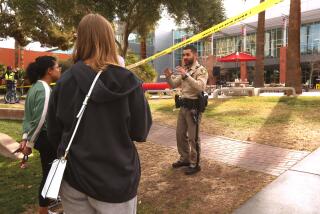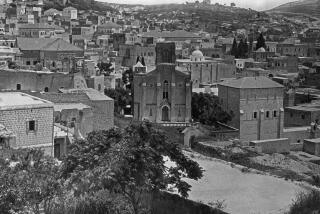Teacher’s Life Low-Profile Until . . . : Hostage: His favorite song was ‘My Way,’ but he never seemed the adventurous type.
- Share via
FISHKILL, N.Y. — Robert Polhill knew that his mother was worried about his living in the war-torn Middle East, and in his letters, he tried to reassure her.
Polhill made the campus of Beirut University College sound like a fortress.
“He was telling me how very safe they were--two gates, with security guards, and all that,” Ruth Polhill recalled in an interview over the weekend.
“Really, mothers know very little,” added the retired school librarian. Indeed, to other associates, Polhill had complained that security was not as good as it could have been.
She said her son had only two weeks left on his teaching contract at Beirut University College, where he taught business and accounting, when terrorists wearing the uniforms of Lebanon’s security police abducted him and three other faculty members from the campus.
Although his favorite song was “My Way,” Polhill, 55, had never seemed the adventurous type to those who knew him.
He was born and grew up in one place--Beacon, N.Y., a small town near Fishkill, where his mother now lives. His father, Milton, the manager of a local car dealership, died when Polhill was a senior in high school.
Polhill originally had launched a career in hotel management, but two years of studies in the subject at Cornell University persuaded him that he wanted to do something else.
He switched to accounting--”devoured it,” his mother said--and finished his studies at New York University, commuting more than 50 miles between Beacon and New York City.
After college, Polhill took a job with a major New York accounting firm. He married and had two sons, Brian and Stephen, who are now in their 20s and share an apartment in the New York City borough of Queens.
Polhill, whose first marriage ended in divorce, later made several trips to Cyprus, where he trained new employees for the firm. It was there that he met his second wife, Firyal, who had been the head of an accounting firm in Beirut.
The couple lived for a while in New York City and often journeyed on weekends back to Polhill’s hometown in the Hudson River Valley.
In 1983, he accepted a teaching stint in Beirut. Firyal’s family was there, and Polhill was excited about the chance to teach in a region that badly needs technical skills, his mother said.
What worried the family most while Polhill was in captivity was his ability to manage his diabetic condition. His wife ran ads in Middle Eastern newspapers specifying the dosage of insulin he needs and how it should be administered.
The family was somewhat reassured when one of the four abducted faculty members, Mithileshwar Singh, was released in 1988. He told the family that Polhill was receiving seven syringes a week.
More to Read
Sign up for Essential California
The most important California stories and recommendations in your inbox every morning.
You may occasionally receive promotional content from the Los Angeles Times.













